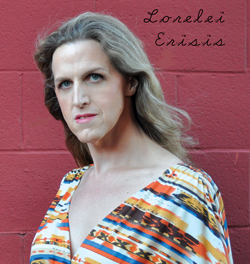By: Lorelei Erisis*/TRT Columnist—
Lately, I’ve been thinking a lot about visibility. I just now finished reading a marvelous and eloquent essay in defense of Caitlyn Jenner written by a later transitioning trans woman, sent to me through a mutual friend. Sent to me precisely because I myself am visible, and this trans woman and our mutual friend felt that this was a perspective I might find useful.
In this essay, which was quite long, this trans woman essentially argues that Caitlyn Jenner is both personally atypical and broadly quite representative of older transitioners. Atypical as she is a person who is already a celebrity and is transitioning under the harsh glare of the full media spotlight. Therefore, any mistakes she makes should be considered in that context. She is representative in that she grew up in a different era, with different mores and expectations, which shaped her views of gender and indeed of the world around her, in a way she shares with those of a similar age.
It’s actually things like this that make me feel qualified to even attempt to offer advice and guidance to my own audience. My visibility and accessibility means that I am regularly contacted by trans-identified people eager to share their story with me to offer their unique perspectives and experiences. My social media feeds and inbox are often so full of these messages that it can feel overwhelming. But even when I am unable to engage, I read all of it; absorb as much as I can.
If this were all, it would be a lot for anyone to take in. But I’m not merely accessible online; I’m visible and approachable in real life, in all my 6’4” punk rock pageant queen fabulousness! As I write this, in fact, I’m sitting in a local café, getting ready to go to my current pay-the-bills job as a waitress in a diner down the street. [pullquote]If by using what little privilege some of us have can save the life of our more vulnerable sisters and brothers and non-binary siblings or if we can make things just a little easier for our youth, are we not morally obligated as caring human beings to do so?[/pullquote]
Between my work as a public figure and my life as a private citizen, I meet so many trans people, both out and very much closeted, and all degrees in-between. When I was recently asked by a new cisgender acquaintance if I knew such-and-such random trans person—as if we all belong to some secret society—I was forced to reply that while it’s kind of a rude question to ask most trans folks, yes, I did actually know the random trans person they were talking about. I know a heck of a lot of trans people all over the world.
It is this great wealth of networked knowledge and experience that I draw on in my own outreach and writing. I am immensely grateful for this—honored to be so well thought of by so many.
It is my visibility that makes this all possible. I am often struck by the number of trans folks I meet who tell me that they were inspired by me in some way, to transition themselves, or to come out in the world. I can only imagine that if I with my small spotlight can inspire so many, then how many more have been lifted up and given strength by the examples of folks like Janet Mock, Laverne Cox, and yes, Caitlyn Jenner?
I think there is little doubt that, despite perhaps the occasional backlash created by the media storm around folks like Jenner, the visibility of those of us who have a spotlight is, in the main, a positive thing—especially in such a media-saturated world.
These are extreme examples, however. I think it could be reasonably argued that those of us who seek the spotlight are often outliers. Most regular folks recoil from this level of exposure. We deliberately court it.
More important, in my mind, and what I want to stress, are those trans folks who are visible in their own smaller spheres. Trans people who are out in their workplaces and to their families—who are active in their communities. [pullquote]I realize we do not live in a perfect world. In a perfect world, no one would need to be “out.” We could simply live our lives. And, for many trans people, it is still not safe enough to be out in these ways. It is a dangerous world for trans people, more so if you are a trans woman, particularly if you are a trans woman of color.[/pullquote]
Caitlyn Jenner might be significant in that now all of Middle-America “knows” a trans person. Someone they’ve grown up watching on television, staring at on their Wheaties boxes in the bleary-eyed morning.
But, that trans girl who works at the local coffee shop, the trans guy at your office, the non-binary person in your class; these unnamed trans people, I think, make the bigger impact in their smaller ways—much more so than Mock or Cox or Jenner. They are real, flesh-and-blood—people that you know, without any quotations around the word. And, if I’ve learned one thing, it’s that it is immensely harder to hate and fear people that you know.
These average, everyday trans people do more to demystify us than any sociology textbook or Diane Sawyer interview. These people are my heroes.
I realize we do not live in a perfect world. In a perfect world, no one would need to be “out.” We could simply live our lives. And, for many trans people, it is still not safe enough to be out in these ways. It is a dangerous world for trans people, more so if you are a trans woman, particularly if you are a trans woman of color.
But, if you have enough privilege to risk being out; if you find the risks within the realm of acceptability by your own assessment; I cannot encourage you enough to be out in your own spheres. It may not seem like much, but every single one of us that is out and visible changes the world just a little bit. The more of us there are, the more of us that people know, the less hate and violence becomes likely.
Yes, it’s risky. Yes, it is potentially dangerous. But isn’t it worth it to take a chance if the reward is a better, safer, more accepting world for those who come after us?
If by using what little privilege some of us have can save the life of our more vulnerable sisters and brothers and non-binary siblings or if we can make things just a little easier for our youth, are we not morally obligated as caring human beings to do so?
To paraphrase a recently departed pioneer of gender-bending fabulousness, the ever-inspirational David Bowie: “We can all be heroes, just for one day.”
Slainte!
*Lorelei Erisis is an actor, activist, adventurer and pageant queen. Send your questions about trans issues, gender and sexuality to her at: askatranswoman@gmail.com.









Most of us who transition late in life are forced by life to be open about it. Unless you are prepared to move to another city and abandon all your social and professional connections, there will be people in your life that knew you before transition, perhaps for twenty years or more. In addition, most late MTF transitioners aren’t able to pass easily; our transgender nature is immediately apparent to anybody with eyes. All those years of the effects of testosterone on the body have left marks that are difficult and expensive to erase. Caitlin Jenner can afford all the procedures to minimize that evidence, but most of us can’t.
That visibility in everyday life can be a burden at times but it is also an opportunity. Simply by living our everyday lives, we show the world what a transgender person can be and what a transgender person can do. I sometimes think of my entire life as a form of activism, and I hope that my example inspires people. That especially applies when we take visible roles, as I do when I volunteer at conventions or teach classes.
I can relate to the later in life transition as I did this very thing. Reflecting back it was probably one of the hardest and possibly scariest steps I had ever taken. I like many did not have a huge surplus of funds to be 100% passable and I knew I was not.
When I did finally transition there were many whom I did think of as friends, we used to do all sorts of things together, all of a suddenly did not have time to do things anymore. Most just distanced themselves, which is hard to take, but there were those who would call me all sorts of hateful names ranging from queer, sicko and pervert. That is very crushing to ones self, that here was someone I knew for 20+ years and they had such venomous hate. There was even some insinuated verbal threats. It is as if being trans was going to somehow contaminate them, that they would catch something.
But thankfully I did have a few friends who stood by me and supported my decision. Those first few years were mentally traumatic to say the least and if not for those few close friends I am not sure what I would have done, but it did lead me to have a deep understanding of what true friends are. Slowly I discovered that, yes it would have been nice to have the funds to do a complete 100% (or as close as possible) transition, but the money was nowhere as important as those few friend who stood by me through it all.
My experience has been different. Perhaps it’s a different world now; perhaps my social circles are just awesome. The people in my life have stayed in my life and I have not experienced the kind of hate you did. Nearly everybody was delighted by my transition; a few were confused but still supportive.
I still get misgendered frequently, and that hurts. It can be hard for people to unlearn so many years of history, but it disappoints me that there are some people who don’t seem to try. (They get the NAME right, it’s the pronouns that trip them up.) But that’s a little thing compared to the trials that other trans people have faced and continue to face; I consider myself fortunate.